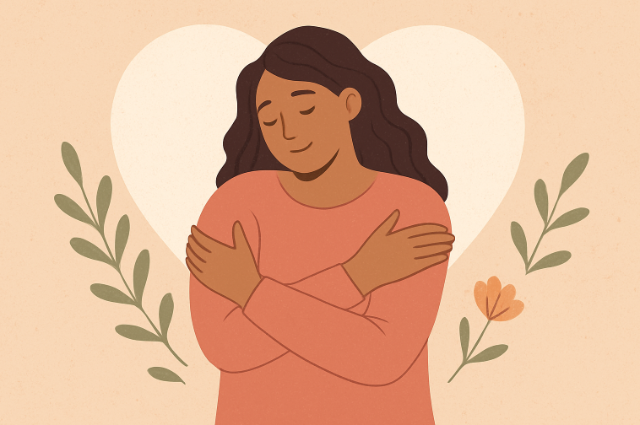
Setbacks are an inevitable part of our lives. Everyone has experienced disappointments in their life. Whether it's an exam failure, job loss, a challenging breakup, losing a close one, or something even more significant, what determines it is how quickly and healthily people recover from these setbacks. We don’t always need support from others, but sometimes an inner dialogue with ourselves. In recent years, psychologists have turned their attention to a powerful tool to deal with setbacks, are self self-compassion
Self-compassion, as defined by Dr. Kristin Neff, one of the foremost researchers in this field, is treating oneself with patience, kindness, and understanding yourself especially in struggle and pain. It is composed of three main elements: self-compassion, common humanity, and more mindfulness.
Self-kindness: Instead of treating oneself with rudeness or blaming oneself for the setbacks, self-kindness teaches us to be kind to ourselves and deal with the failures positively, and have a friendly self.
Common humanity: Instead of blaming and crying over failure, we should recognise that everyone makes mistakes and has to deal with difficulties. Setbacks are a common human trait.
Mindfulness: Practising mindfulness, staying in the present. Reflect on your thoughts, observe your emotions, and accept your pain without any judgment.
Self-compassion is different from self-pity. Self-pity can lead us to isolation, whereas self-compassion connects us to others through our shared experiences. Self-compassion encourages self-care and responsibility. In fact, a major study published in Personality and Social Psychology Bulletin found that people who scored higher on self-compassion measures had 40% lower rates of anxiety and depression compared to peers who were highly self-critical.
Multiple studies have shown that self-compassion is linked to greater emotional resilience, lower anxiety and depression, and increased happiness. When faced with setbacks, self-compassionate people tend to recover from these failures more easily than those who prioritise their self-esteem over self-care. Self-compassion acts as a buffer, allowing individuals to process disappointment constructively and move forward easily.
Moreover self self-compassion has been found to improve motivation. Research indicates that self-compassion is more likely to take responsibility for their mistakes and take essential actions towards those challenges instead of getting stuck in denial.
When setbacks occur, one always responds harshly, “I failed again”,” Why always me?”,” I am not worth anything”,” I will never succeed. “This self-criticism can deepen pain and delay the recovery process. By not being kind to oneself, we often blame and end up being disappointed. Self-compassion interrupts this pattern and replaces criticism with support. For instance, "I am disappointed, but at least I tried my best" could be a self-compassionate response to failing a significant exam. Everyone has setbacks, but I can ask myself what I can learn from this. This method promotes problem-solving and aids in emotional regulation.
Self-compassionate people recover from setbacks faster and are less likely to suffer from chronic stress or burnout, according to studies. Even after making mistakes, self-compassion predicts higher job satisfaction and lower levels of fatigue. It makes it possible for people to own up to their mistakes without feeling ashamed, which improves relationships and builds trust.
Building self-compassion is a skill that anyone can develop with practice. Here are some evidence-based strategies:
To start self-compassion, start practising mindfulness, begin by noticing, especially in moments of failure. Instead of judging oneself, start accepting emotions as the first step in self-compassion, using self-kindness phrases. When you start criticising yourself, start positive talks. Try saying everyone makes mistakes or “This doesn’t mean I’m flawed.” Even writing a compassionate letter to yourself can help reinforce this internal dialogue. Acknowledge our common humanity by reminding yourself that failures happen everywhere. Talk to your family and friends. Read about the experiences of others who have faced comparable obstacles. It helps normalise your struggle. Maintain a Self-Compassion Journal, record your challenges, and reinterpret them using mindfulness, self-kindness, and your shared humanity. According to one study, students who wrote self-compassion letters for just two weeks experienced less shame and increased confidence.
Start practising guided exercises. There are a lot of tools and applications that provide self-compassion-focused exercises like meditation. When setbacks feel too much to handle, these can be excellent for daily practice.
Studies show self-compassionate interventions can reduce shame and self-criticism by up to 50% and anxiety and depression by up to 40% compared to controls.
Although setbacks are inevitable, how we handle them has a big impact on how we feel in the long run. Self-compassion is a strength that strengthens our resilience and enables us to face our obstacles head-on, not a weakness. We can turn our failures into opportunities if we acknowledge our errors and make constructive corrections. Start with small, mindful actions and encouraging words to cultivate self-compassion. The most effective strategy to overcome obstacles and succeed is to practice self-compassion. Ups and downs in life
